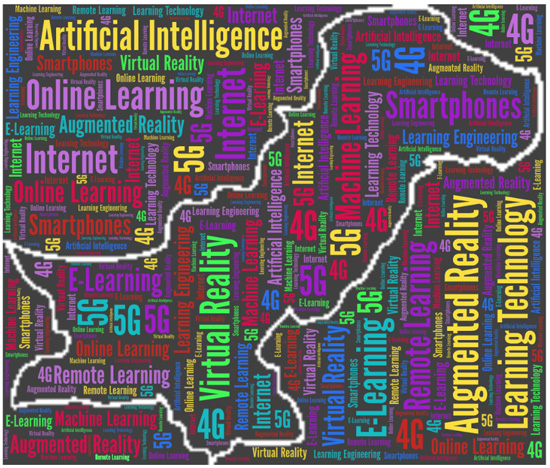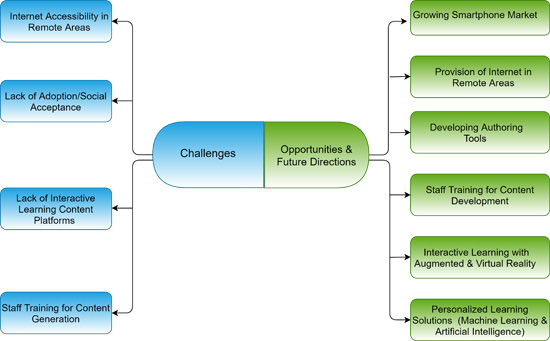Authors: Muhammad Zahid Iqbal, Abraham Campbell
Posted: Fri, February 05, 2021 - 2:14:12

Educational technology has been rapidly advancing—smartphones, tablets, augmented and virtual reality, and high-speed Internet, 4G, and 5G connectivity. All of this makes online learning more productive, adaptive, and accessible. In fact, the e-learning industry is currently valued at more than $200 billion and is expected to top $375 billion by 2026. Even so, Pakistan has some of the world’s worst educational outcomes. For example, it has the world’s second-highest number of children not in school: 22.8 million children ages 5 to16, which is 40 percent of Pakistan’s school-age children.
In an unfortunate twist, the onset of the pandemic coincided with Pakistan’s struggle to implement a uniform curriculum across all provinces. As coronavirus control measures spread throughout South Asia, departments of education and higher-level universities found themselves poorly or, in most cases, completely unprepared for online learning and delivering distance learning. In the past, Pakistan had closed educational institutes due to terrorist attacks and political threats, but there was still no official policy around online education.
Pakistan has an emerging mobile-phone-user market—currently 75 percent of the population uses mobile technology. But out of a population of 220 million—the fifth most-populous country in the world—there are only 76.38 million internet users. That’s only 35 percent of the population, with only 17 percent using social media. Facts on the ground show that accessibility to the Internet is the major hurdle to adopting an e-learning system. Resistance to adopting technology or new learning pedagogy and being used to the classroom environment also play a negative role in resistance to online learning policy.
E-learning initiatives in Pakistan and future prospects
When schools were forced to shut, Pakistan started seeking alternative solutions to the globally adopted “suspending classes without stopping learning” policy [1]. One idea was the establishment of a national TV channel for education that would provide equal educational opportunities for all students. The channel programmed content for kindergarten through high school and provided one lesson per day to each grade, so students would have to watch in shifts. Also, during the second wave of Covid, Radio Pakistan started transmitting “radio school” to promote virtual learning in the country for primary-level students, as a part of an effort toward overcoming the digital divide.
In the higher-education sector, Virtual University is at the forefront of virtual learning, providing full-time online learning courses, from bachelor's to Ph.D. level, in different subjects. As the pandemic disrupted education, Microsoft Teams were deployed in Pakistani universities to build connection between students and teachers. Previously, Microsoft and the Citizens Foundation (TCF) collaborated to provide technology-based education in underdeveloped areas. The eLearn Punjab program has generated educational content based on videos and illustrations for primary and secondary school classes. And in tackling the digital divide in gender, The Malala Fund has investigated Covid as an amplifying factor for the girls’ education crisis in Pakistan.

Figure 1. Challenges and possible solutions for the educational landscape of Pakistan.
Lessons learned from the pandemic can be used as an opportunity to redesign learning spaces and restructure the curriculum to facilitate student learning, as shown in Figure 1. This abrupt wake-up call should prompt all relevant stakeholders to reflect on the true purpose of schools and the future of learning in this country.
In Pakistani institutes, there is a lack of technically trained teachers to run online classes smoothly. To strengthen blended, distance, and online learning, there is a need to provide more awareness and accessibility to MOOCs, Coursera, and EdX. There is also a need to develop innovative, immersive learning technologies and modern education spaces using virtual, augmented, and mixed reality technology [2]. These technologies, along with the use of artificial intelligence (AI) and machine learning (ML), can change the future of learning by helping us build more interactive, personalized, and productive learning solutions. More specifically, when we talk about practical, hands-on learning in STEM, where there is an urgent need for learning material, augmented reality can provide virtual material to help teach with the kinesthetic learning approach [3].
Technologically developed countries have innovative and advanced systems for e-learning, allowing them to stay in the loop and keep the learning flow active during this academic year. But in Pakistan, online learning is at a nascent stage. Having started as emergency remote learning, it needs further investment to create more adoption and overcome limitations. Along with the establishing the Internet in remote areas, developing specialized authoring tools, and creating awareness for getting the most out of online learning, faculty need training to use online modalities and innovative pedagogies to reduce cognitive load and increase interactivity. In his book 21 Lessons for the 21st Century [4], Yuval Noah Harari highlighted a drawback of the current state of education:The focus is on traditional academic skills rather than critical thinking and adaptability, which are needed to create opportunities and success in the future [2]. This critical period, which is moving us rapidly toward the adoption of e-learning, can spark more focus on providing Internet facilities in remote areas, developing more innovative, low-cost learning solutions, and creating more adaptive and effective methods of learning in the near future.
Endnotes
1. Zhang, W. et al. Suspending classes without stopping learning: China’s education emergency management policy in the Covid-19 outbreak. J. Risk Financial Manag. 13, 3 (2020), 55; https://doi.org/10.3390/jrfm13030055
2. Campbell, A.G. et al. Future mixed reality educational spaces. Proc. of 2016 Future Technologies Conference. IEEE, 2016.
3. Köse, H. and Güner-Yildiz, N. Augmented reality (AR) as a learning material in special needs education. Education and Information Technologies (2020), 1-16.
4. Harari, Y.N. 21 Lessons for the 21st Century. Random House, 2018.
Posted in: Covid-19 on Fri, February 05, 2021 - 2:14:12
Muhammad Zahid Iqbal
View All Muhammad Zahid Iqbal's Posts
Abraham Campbell
View All Abraham Campbell's Posts







Post Comment
@helga (2024 08 01)
Getting through the hard times these knowledge are really helpful in the future! Thank you! I love Build Now GG
@WinnieYara (2025 06 09)
I’ve observed that Covid-19 accelerated the push for digital learning in Pakistan, but infrastructure gaps and limited internet access posed major hurdles. I’ve worked with health and wellness center educators facing these issues, and it’s clear that localized solutions, teacher training, and affordable tech are crucial for making learning technology truly effective and inclusive.
@candaceoliver (2025 08 10)
There’s a soft steadiness in your voice that never wavers. It gives a sense of comfort even when the ideas are new or unfamiliar nbi verification online. That consistency helps the message stay with the reader.